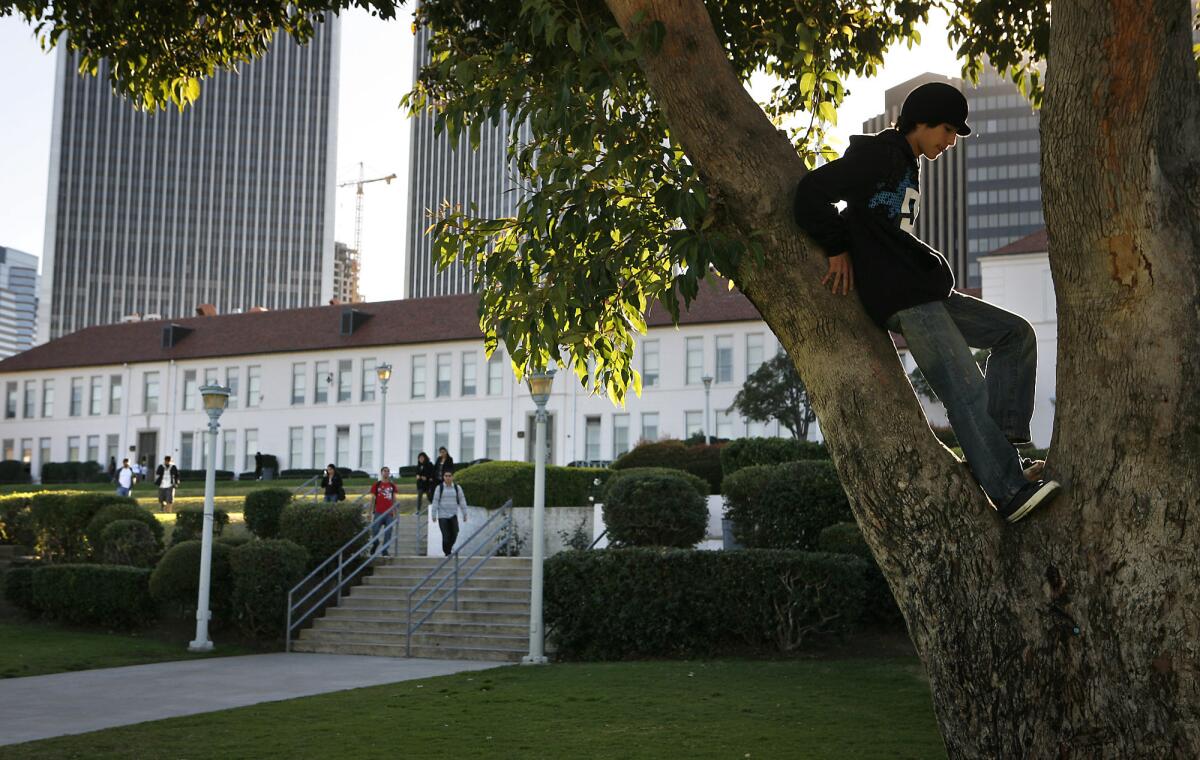Improprieties found in operation of Beverly Hills camp

- Share via
A report commissioned by the Beverly Hills Unified School District has found a number of financial and ethical improprieties related to a summer sports camp that was run by the high school principal — including his failure to report more than $40,000 in earnings.
In addition, the review found that the principal, Carter Paysinger, used the camp’s bank account as overdraft protection for a personal account and probably violated district conflict-of-interest and ethics rules. The inquiry also revealed that the camp brought in tens of thousands of dollars more in revenue than previously reported.
The review, which was conducted by a law firm hired by the district, came in response to articles in The Times last year that found that the Beverly Hills Sports Academy, a for-profit sports camp held on the high school campus, was operated by Paysinger and two school employees. The Board of Education requested a review of the sports program last year after parents raised concerns.
The Times obtained the final report under a California Public Records Act request.
The Los Angeles County district attorney’s office said last week that it had concluded an investigation into Paysinger and the camp — clearing him of any criminal wrongdoing.
Paysinger’s attorney, Reed Aljian, said the school principal has done nothing unlawful and has not violated any district policy.
“The report is a collection of the investigator’s false statements, unsupported legal conclusions and speculation,” Aljian said. “Mr. Paysinger did not engage in any wrongdoing.”
Beverly Hills schools Supt. Gary Woods declined to comment.
Paysinger’s failure to account for the $40,000 he received from the camp “implicates several district policies,” including conflict-of-interest and ethics rules, the report said.
“Ultimately, the District must determine what it expects from employees under its Professional Standards Policy,” the report said. “However, certainly a fair argument can be made that Mr. Paysinger’s handling of his relationship with the Academy since becoming Principal … has not met those expectations.”
Paysinger’s contract expires at the end of the school year and he is currently in negotiations with the district.
Paysinger’s supporters, who have turned out at recent Board of Education meetings, say he has done nothing wrong and has led the campus during a period of academic achievement.
After Paysinger became principal, he was required to fill out economic conflict-of-interest statements. In those statements — for 2010 to 2013 — he did not declare any possible conflicts, according to the documents provided by the district and included in the report.
Paysinger initially told investigators that he did not receive any money related to the camp after becoming principal, but later provided documents showing the compensation.
He told investigators that the checks were intended for his brother, who is the school’s athletic director, and were transferred to him in more than 80 transactions over three years, according to a draft version of the report reviewed by The Times last month.
But the final report found that there was no way to tell whether these payments were made. Documents provided by Paysinger and his attorney listed them as cash withdrawals, or checks without a specified payee — insufficient evidence to prove that the money was transferred to his brother, the report said.
The purported arrangement “at best lacked transparency,” the final report said. “More significantly, the arrangement created a fiction for tax and potential liability.”
The review concluded that the compensation, no matter who eventually received the funds, raises the possibility of ethics violations by Paysinger.
The report also found at least $14,540 in overdraft transfers were made to Paysinger’s personal account over a three-year period. Paysinger told investigators that he had been unaware of the link and paid back the transfers once he realized they occurred.
Investigators could not confirm that he had done so, the final report said.
The school district had previously said the academy took in $60,000 to $70,000 a summer.
Investigators reviewed bank records that showed the academy brought in $113,791 in summer 2010, the only year examined. About $67,000 — believed by investigators to be used to pay coaches who worked at the camp — was withdrawn from the academy’s bank account and deposited into an account belonging to GW Prep Baseball Inc., a nonprofit organization hired by the camp to provide accounting services.
The review also found that since its inception, the sports camp operated with the consent of district administration and made “good-faith efforts” to address issues and concerns from district officials.
Parents have said they were led to believe that the academy was a mandatory, school-sanctioned camp for athletes and that fees would help fund sports teams. Others say that they were strongly encouraged by the principal and other administrators to enroll their children to give them a better chance of making the teams.
More to Read
Sign up for Essential California
The most important California stories and recommendations in your inbox every morning.
You may occasionally receive promotional content from the Los Angeles Times.














